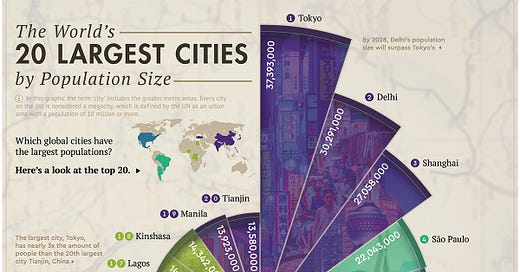The Sunday Brew #101
In this brew - 20 Largest Cities in a picture | Focusing Illusion & Concept Creep | Starlink to enter India, US probes TSMC and Google Leadership Restructuring
Welcome to The Sunday Brew, weekly 1-2-3 newsletter by The Percolator. Every Sunday we drop in your inbox 1 story in a picture, 2 concepts, ideas or frameworks to expand your horizons and 3 news from the week, to keep you updated.
If you are not a paid subscriber, here is what you missed last week:
Keep reading with a 7-day free trial
Subscribe to The Percolator to keep reading this post and get 7 days of free access to the full post archives.






